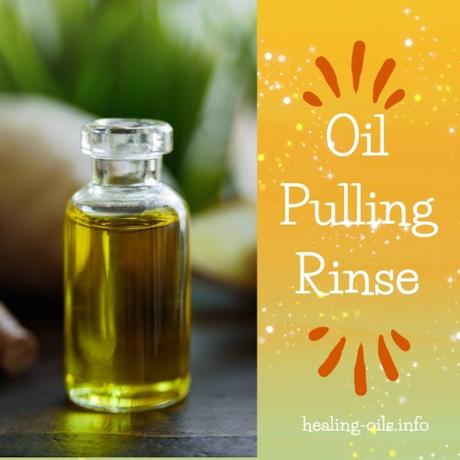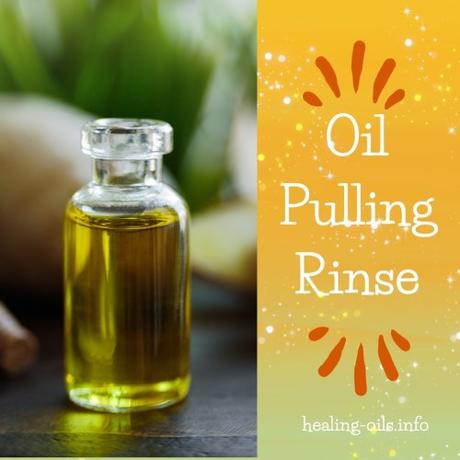Does oil pulling work for you? If not, don't worry. It didn't work for me either, at first. After trying several different oils with no success, I've finally cracked the code on how to get oil pulling to work.


Natural Gum Health
I was very interested in trying oil pulling because I had bleeding gums which are a symptom of gingivitis. I was disappointed when I didn't see results and tried several different oils with the same lack of results.
Finally, I did a bit more research and added herbs to the oil. That was the magic trick. I saw my gums get healthy, and the bleeding stopped when I brushed my teeth. Would you like the recipe? I'll give it to you and explain the purpose of the ingredients. I'll also give you an alternative you can buy if you don't feel like making your own.
There are a few different herbal oils that may be helpful for reducing gum inflammation and treating gingivitis. Here is a recipe for the herbal oil blend that helped me out:
Herbal Oil Pulling Rinse
Ingredients:
Instructions:
- In a small saucepan, melt the coconut oil and sunflower oil over low heat.
- Once the oils are melted, remove the saucepan from the heat and add the dried herbs. Stir to combine.
- Allow the herb-infused oil to cool to room temperature.
- Once the oil has cooled, add the tea tree essential oil and stir to combine.
- Transfer the oil to a small glass jar with a tight-fitting lid.
- To use the oil, take a sip and swish the oil like a mouthwash. Rinse your mouth with warm water afterward.
It's important to note that this oil blend is intended for topical use only, and it should not be ingested. Now, to explain the benefit of the ingredients. Here are the potential benefits of each ingredient in this herbal oil blend:
Coconut Oil
Coconut oil has antimicrobial properties, which may help to reduce the growth of bacteria that can cause gum inflammation and gingivitis.
Sunflower Oil
Sunflower oil is rich in vitamin E, which may help to reduce inflammation and promote healing.
Calendula Flowers
Calendula has anti-inflammatory and antibacterial properties, which may help to reduce gum inflammation and prevent the growth of bacteria.
Chamomile Flowers
Chamomile has anti-inflammatory and soothing properties, which may help to reduce gum swelling and discomfort.
Comfrey Leaves
Comfrey has anti-inflammatory and tissue-healing properties, which may help to reduce gum inflammation and promote healing.
Myrrh has antimicrobial and astringent properties, which may help to reduce gum inflammation and promote healing.
Yarrow Flowers
Yarrow has astringent and anti-inflammatory properties, which may help to reduce gum inflammation and promote healing.
Tea Tree Essential Oil
Tea tree essential oil has antimicrobial and anti-inflammatory properties, which may help to reduce gum inflammation and prevent the growth of bacteria.
It's important to note that the effectiveness of these ingredients may vary from person to person.
Does Oil Pulling Work Better with Herbs?
Herbs make all the difference, but if you'd rather not make your own, another blend I've had luck with is Dale Audrey's Ayurvedic Oil Pulling Rinse. It comes in several flavors-ginger, mint, cinnamon-but my personal fave is the bubblegum flavor.
It's important to remember that this herbal oil blend is intended for topical use only and should not be ingested. If you are using the oil as part of a comprehensive oral hygiene routine, it's important to continue to brush your teeth at least twice a day and floss daily to help prevent the build-up of plaque and bacteria.
The frequency with which you should use this herbal oil remedy will depend on the severity of your gum inflammation and gingivitis, as well as your individual response to the treatment. In general, you can oil pull once or twice a day as needed. If you are using the oil to treat a specific area of gum inflammation, you may need to apply it more frequently.
If you are using the oil and do not see improvement in your symptoms within a few days, or if your symptoms worsen, it's a good idea to speak with a healthcare professional for further evaluation and treatment. They can help determine the underlying cause of your gum inflammation and recommend the most appropriate course of treatment.
Hopefully if someone asks, does oil pulling work, now you'll be able to answer y es, it does!

